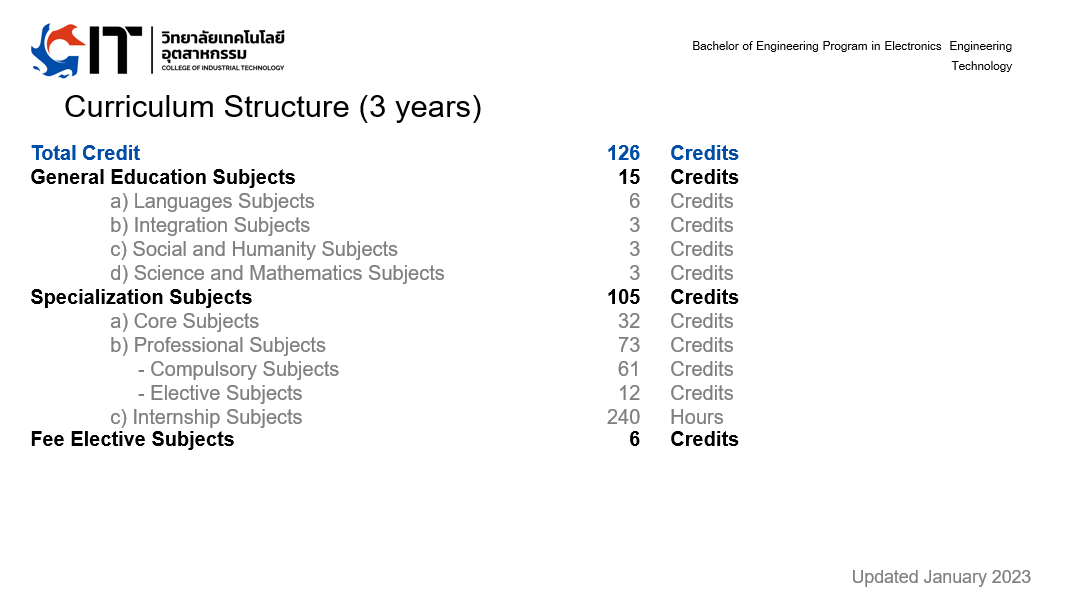Electronics Engineering Technology (Transfer Course)
The Electronic Engineering Technology Department is part of the College of Industrial Technology (CIT) and consists of four departments: Broadcasting, Computing, Instrumentation and Control, and Telecommunications. The Electronic Engineering Technology Department offers two undergraduate programs, a three-year Bachelor of Engineering program. /4 years in Electronic Engineering Technology (EnET) and Bachelor of Industrial Technology Program 2 years in Electronic Technology (ECT-EIT-ETT) and one more Graduate of the 2-year Master of Engineering Program in Applied Electronics Engineering Technology (MEEE). For both bachelor’s degree programs, students will learn the basics of electrical engineering. Electronics and digital, along with engineering specific knowledge depending on the student’s chosen field of study. Students will also apply their theoretical knowledge and practical skills to solve real-world problems in the private or public sector during their internship. for graduate programs Students will learn advancements in electronics and digital devices, IoT, wireless and wired networks, signal and image processing. and industrial control. Finally, the department adheres to the educational philosophy of producing personnel with knowledge and expertise in both theory and practice. able to communicate and work with others in various professional fields very well Able to learn and use modern technology for the benefit of society as well as being aware of the morality and ethics of the profession
Radio and Television Broadcasting – Focuses on the design and production of radio and television broadcasting materials. able to control operations in the station able to install and check the operation of the equipment as well as the application of modern technology for radio and television broadcasting
Computer Science – Focuses on students to design and apply knowledge of computer engineering both hardware and software. Be able to design and analyze data structures, algorithms and artificial intelligence techniques to solve problems. Able to design and develop software systems Web applications and database systems able to design a network
Measurement and Control Instrumentation – Focuses on students to be able to use measuring instruments and detection devices appropriately in industry. Be able to design electronic circuits for control measurements. Be able to design and analyze industrial control systems. Able to use computer programs for industrial control
Telecommunications – Focuses on students to understand and design analog-digital communication systems. and computer networks, both wired and wireless Be able to design microwave circuits and propagation devices. Able to use simulation program in communication system work and design communication equipment
Program 3 years Credits 126 Credits
Electronic Technology Program (Continuing)
ELO 1 (S) Be able to apply basic knowledge of mathematics. and electrical and electronic technology. To solve fundamental problems in the electronics industry and related correctly according to academic principles
ELO 2 (S) Have practical skills in using tools and equipment, including technology for professional practice. in the field of electronic technology and related correctly, appropriately and safely
ELO 3 (G) Be able to operate in accordance with ethical and ethical principles.
ELO 4 (G) Ability to explore, learn, think critically, and work with others. and present information effectively
Computer
ELO C.1 (S) can design and implement embedded systems in industrial applications efficiently.
ELO C.2 (S) can be applied. data structures, algorithms, and artificial intelligence techniques to solve industrial problems.
ELO C.3 (S) can design and develop software systems. web application database system to the business and industrial sectors with international standards
ELO C.4 (S) can install and maintain computer network systems for business and industry.
Broadcast
ELO B.1(S) Be able to design and produce media in radio and television broadcasting with the appropriate selection of specialized computer equipment and programs.
ELO B.2(S) Be able to control operations in radio and television broadcasting stations in accordance with international standards.
ELO B.3 (S) Be able to apply knowledge in installing, fixing and inspecting equipment in radio and television broadcasting systems.
ELO B.4 (S) Be able to apply engineering knowledge to radio and television broadcasting.
ELO B.5 (S) Be able to apply knowledge in installing, fixing and inspecting equipment in lighting, color, sound and stage systems in accordance with international standards
Instrumentation and Control (Instrumentation and control)
ELO I.1 (S) is able to apply appropriate industrial measuring instruments and related equipment.
ELO I.2 (S) Appropriate skills in industrial measurement and control work.
ELO I.3 (S) Able to use and select computer programs for industrial control applications appropriately.
ELO I.4 (S) optional controller power transmission equipment and connected devices or circuits appropriately
ELO I.5 (S) can design and tune basic industrial control systems.
ELO I.6 (S) can calculate and analyze basic control systems.
Telecommunication (Telecommunication)
ELO T.1(S) Able to apply theoretical and practical knowledge and skills in analog and digital communications. for proper care and improvement of the system
ELO T.2 (S) can use knowledge of wireless and wired transceivers to install. Take care and improve the system correctly according to academic principles.
ELO T.3 (S) can install and use tools to design and improve communication networks according to standards.
ELO T.4 (S) Be able to design and apply knowledge of electronic circuits. Embedded computers and communications for designing control over a network.
- Student must earn a Higher Vocational Certificate in Electrics/Electronics or Instrumentation or Computer or Telecommunication or its equivalency with the regulations of the Ministry of Education

Semester 1: June – September
Semester 2: November – February
Potential Careers after Graduation:
- Electrical and electronics engineers
- Audiovisual telecommunications and distribution engineers
- Computer Engineer
- Research Assistant
- Employees of state enterprises, employees of private companies engaged in electronic engineering
- Entrepreneurship
- Educational personnel
- Control and automation measurement engineers
Contact Details:
Department of Electronic Engineering Technology,
4th Floor, Building 63 College of Industrial Technology
King Mongkut’s University of Technology North Bangkok
1518 Pracharat 1 Road, Wong Sawang, Bang Sue, Bangkok 10800
![]() +66 2 555-2000 ext. 6333
+66 2 555-2000 ext. 6333
![]() https://www.facebook.com/eleccit
https://www.facebook.com/eleccit
![]() nucharinh@cit.kmutnb.ac.th
nucharinh@cit.kmutnb.ac.th

